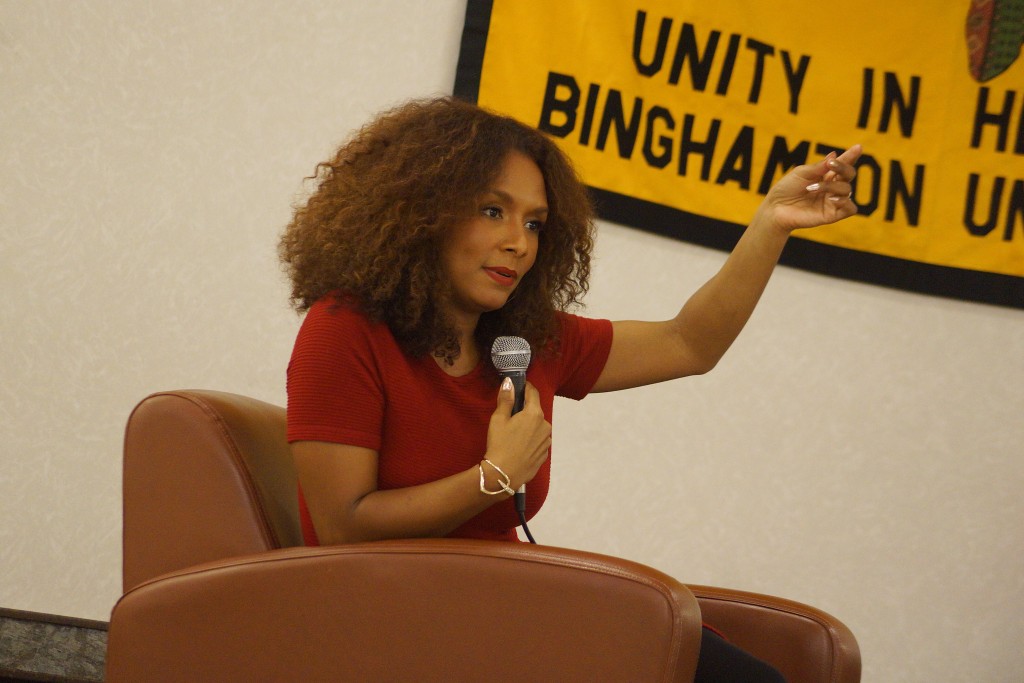
Binghamton University’s Black Student Union (BSU) brought activist Janet Mock to be the Black History Month keynote speaker.
Mock is the New York Times best-selling author of “Redefining Realness,” the host of a digital series on MSNBC called “So Popular!” and has been interviewed by celebrities like Stephen Colbert and Oprah Winfrey.
This Black History Month’s theme is “all black lives matter,” referencing the activist group Black Lives Matter. Mock praised this theme because she said even within activism, dominant voices are too frequently the faces of movements.
“Who are the voices we tend to hear the most?” Mock said. “They tend to be cis-gendered, straight, college-educated black men. That’s who the microphone usually tends to go to. We’re in a space now where the charismatic male leader is being challenged.”
Mock talked about intersectionality in activist communities and how her experiences moving between racial justice, feminist and LGBTQ movements have shaped her experiences. She added that she often centers transgender women of color in her work, both as a journalist and as an activist, because these marginalized groups often go unnoticed.
“If you look at many racial justice, feminist and LGBT activist coalitions, one is on race, one is on gender and one is on sexuality,” Mock said. “Because we work and think in a single identity focus politic, we forget certain people that don’t simply fall in line, and they fall in between the cracks of those coalitions.”
In addition, Mock talked about many issues facing her communities today like healthcare, education, shelter, violence and harassment. In response to these, she talked about how knowing and realizing people’s struggles, working together as allies and raising awareness can help those in need. She added that often the only times marginalized people are given visibility is in correlation with trauma.
“When we speak trans women of color names, it’s often when they cannot speak back,” Mock said. “Similar in the sense that we often speak the names of black people when they are no longer there to respond. We all know Michael Brown and Sandra Bland’s name, but why aren’t we speaking these people’s names before they’re subjects of trauma?”
Urenna Nwogwugwu, a junior majoring in integrative neuroscience, said one of the things that stuck out to her was Mock speaking about changing, and taking possession of one’s own narrative.
“It hit me in terms of diversity, when she talked about the fact that it caters to whiteness rather than allowing for inclusion like it’s supposed to, and then what she said about changing the narrative in terms of how we address marginalized groups on campus,” Nwogwugwu said.
When asked about her experiences in college campuses across the U.S., Mock said all too frequently marginalized groups are seen as educational to dominant student bodies. She said that it is imperative that this mindset is changed.
“Know that this is your space and you must advocate for that while being cognizant of the fact of what the system means when they say ‘diversity,’” Mock said. “You need to shift in your own mind and say that ‘this is our space too, and we’re not just here in order to give these folks a conversation or elevate their knowledge around diverse experiences.’”
Nwogwugwu said that Mock’s talk was important, and that it was a reminder for her to be an ally to all individuals.
“I thought it was very educational,” Nwogwugwu said. “We don’t tend to focus on issues that aren’t relevant to us. As a heterosexual, cis black woman I tend to really focus on black feminism, so hearing someone talk about LGBTQ issues reminds me that I need to focus on more than just me and what affects me.”


